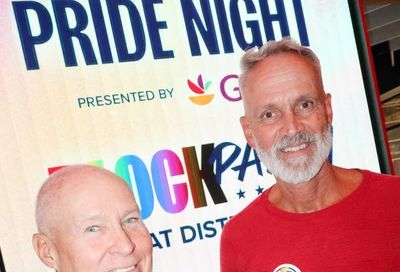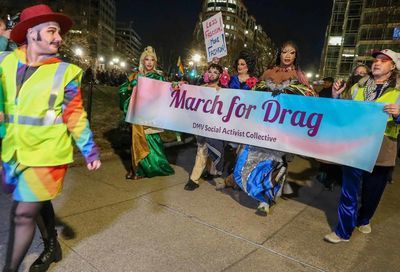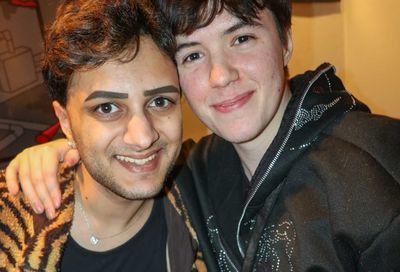The Victor: Q&A with Victory Fund’s Chuck Wolfe
Having helped elect hundreds of LGBT candidates to public office nationwide, Victory Fund's Chuck Wolfe moves on
WOLFE: It was a good year, but it wasn’t our best year. We had 63 percent of our candidates win their races. That’s about 100 victories. We had all our incumbent members of Congress re-elected that were running. Even in swing districts, like Kyrsten Sinema and Sean Patrick Maloney. I point that out because that was not the norm this year, so they defeated the norm. None of our non-incumbent congressional candidates were successful, but all of our incumbents beat back their challengers, which was pretty good. And we had some great state legislative wins. Michigan for awhile hadn’t had anybody in the state legislature [who was out] and now has two. That was a great get. Idaho now has an out member of the legislature, that’s a great get. There are a lot of cool wins and I think people who have bright futures.

MW: There were some reports about the race in Maine about gay donors not getting behind Mike Michaud. Why do you think that race didn’t attract the kind of attention that someone like Tammy Baldwin did when she ran for the Senate in 2012. Was it because he came out so late in life?
WOLFE: There are a number of factors, but these are not reasons why Mike Michaud is not governor. These are reasons if you’re doing a story that’s analyzing the engagement of LGBT donors that probably is true for all candidates. So Tammy was out when she ran for the Dane County Commission in the mid ’80s, was out when she ran for the Wisconsin legislature in the early ’90s, was out when she ran for Congress and won in 1998 and then was out, of course, when she ran for the United States Senate and won.
Mike Michaud came out a year before the election. Expecting the same level of engagement of a 30-year political career as an out candidate versus a one-year political career as an out candidate is a little unfair, I would think. There’s going to be a natural difference just in how many people she has touched over that 30 years, that she’s gotten to know and support her. I also think there is a shift in what LGBT donors are paying attention to since 2012. This was not a year where our community was nearly as engaged as it was in 2012.
MW: Why do you think that was?
WOLFE: I don’t know. There’s lots of speculation. Do people feel like we’ve won, so they have to be engaged less? Does our community have the same lack of engagement in a midterm as any other community? Perhaps. Does that mean we’re now mainstream and we find less reason to engage? I don’t know. I think there were probably many things that influenced that. Financially, are people as able to participate as they were two years ago? Did they just feel like they had to dig deep in 2012 and support not only the president but a lot of LGBT candidates, including Tammy? All good questions that would probably make for good stories, but I’m not sure that listing all the possibilities gets you any closer to what the real reason is — and it may be nothing more than simply a collection of individual issues, individual thoughts.
MW: Are there any gay Republicans on the horizon you see potential in?
WOLFE: Well, you have two issues there. Can we have some of the Republican members of Congress come out? That’s one option. The other option that there are Republicans who step up and run. Some of them would have to come out in their state legislature races or seats or other positions they hold. So, yes, there will be some openly gay Republicans in Congress within the next 20 years. I’m not going to predict exactly when, but it’ll happen. They’re there, they’re just not out.
MW: Victory Fund has faced criticism from some within the movement for endorsing Republicans because they argue, among other things, that Republicans don’t support the progressive values the LGBT movement should stand for.
WOLFE: This is a new birth of an issue. It’s a partisan fight to which we don’t engage. This is a question of partisans wanting to control their agenda, their message that there’s only one party that matters. If there’s ever going to be a time when everybody is going to get reminded that that’s not the case, it’s now when you have Republican control of the House and the Senate and a Democrat in the White House.
The country was not founded to be ruled by one party. So, the ideal was that people who serve would look like the people they represent. The people they represent are Democrats and Republicans. There are gay Democrats and there are gay Republicans. This idea that supporting an openly gay Republican is bad for democracy or the Democratic Party is spurious. It’s just a ludicrous argument. It is nothing but a truly partisan argument.
Now, I was asked many times by many close friends who are very loyal Democrats, “What are you going to do if a Republican you endorse is the last and final vote for a Republican speaker?” Privately I’d say, “Hallelujah! Imagine the bargaining chip that one member of Congress is going to have if that’s truly the case.” Now, it isn’t the case, it wasn’t the case, it has never been the case in my lifetime that we’ve gotten down to a single vote that makes the difference between a speaker.
Look, I get it. I’m not tone deaf to the fact that one party is a hell of a lot more supportive of our community than another. I understand that. That said, if I have an opportunity to put an openly gay person or an out lesbian in the Republican caucus who can speak up inside that caucus meeting I’m going to do it. I just don’t understand the argument that it would be a bad thing for democracy, for the country or for our community. I think it would be a brilliant thing. So that’s why we’ve never backed off of that position, that we will endorse and support people regardless of their party.
MW: On the flip side of that, there was another argument that emerged this election cycle from one gay Republican in particular, Carl DeMaio in California, who accused Victory Fund of being partisan and not supporting gay Republicans who can actually win.
WOLFE: Somewhat ironic because we didn’t endorse him. It’s nice that these arguments get made and it’s healthy. Our mission has been very clear since we were founded in 1991: we’re a nonpartisan organization. It’s not news that we support people of both parties. It wasn’t news when we endorsed and supported Jim Kolbe when he represented Arizona in Congress and our community supported him. It wasn’t news that in Arizona itself we had an out senator and an out mayor, all Republicans.
As partisanship has grown and as the division has gotten more severe, it’s just a way for people to drive more wedges. Our mission is a longview question. We really do buy into this ideal that making democracy look like the people who are in it is good. And so that’s who we support. We don’t have a score sheet on how they vote on individual issues, we don’t lobby them on any individual issue and I think what people do is compare us to other organizations that are lobbying organizations and just assume we’re going to support people just because they vote a certain way on a certain issue. But we just don’t do that. We want good, solid, qualified, viable LGBT people to serve in public office. City council and school board, to the United States Senate, regardless of party, regardless of history, regardless of family, any of those things. That’s what we’re trying to do and I think when history is written, that longview will play out as being beneficial to not just our community but in a bigger sense.
MW: Would you agree that you can’t have full equality until both parties are on the same page?
WOLFE: A big step toward full quality is getting both parties supporting it. But I would argue that even when both parties might pass something as momentous as the Civil Rights Act you still weren’t at full equality, so I wouldn’t want to give the impression that simply voting for or passing a bill that says we’re all equal then causes equality. We’ve had plenty reminders in the past few weeks that there are communities in our country that are still not equal regardless of what the law says.
MW: An aspect of Victory Fund that doesn’t always get addressed are presidential appointments. We’re at a moment right now where the number of out federal judges is at historic levels.
WOLFE: Whatever role we’ve been able to play in recommending candidates to the White House for appointment is great. The longstanding measure of their appointment will be what was accomplished in the agencies they’re in, what was accomplished in the positions they held.
Here’s the exciting thing about presidential appointments: it’s the variety. You have people serving on boards and commissions, as agency and department heads, and young people serving inside the White House. It’s an amazing variety of people who are out there working in public service who are from our community. And to the extent that we were able to help with that, providing binders full of gays. [Laughs.]
MW: Nothing like a Mitt Romney joke…
WOLFE: …To really get ’em going.
MW: When do you think we might have a viable presidential candidate who is gay or a gay Supreme Court justice?
Support Metro Weekly’s Journalism
These are challenging times for news organizations. And yet it’s crucial we stay active and provide vital resources and information to both our local readers and the world. So won’t you please take a moment and consider supporting Metro Weekly with a membership? For as little as $5 a month, you can help ensure Metro Weekly magazine and MetroWeekly.com remain free, viable resources as we provide the best, most diverse, culturally-resonant LGBTQ coverage in both the D.C. region and around the world. Memberships come with exclusive perks and discounts, your own personal digital delivery of each week’s magazine (and an archive), access to our Member's Lounge when it launches this fall, and exclusive members-only items like Metro Weekly Membership Mugs and Tote Bags! Check out all our membership levels here and please join us today!


























You must be logged in to post a comment.